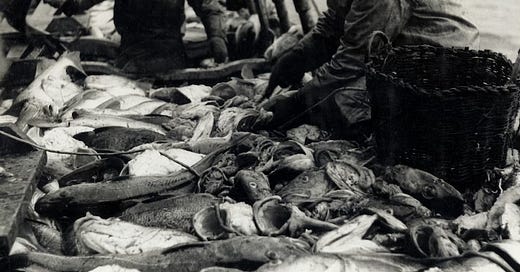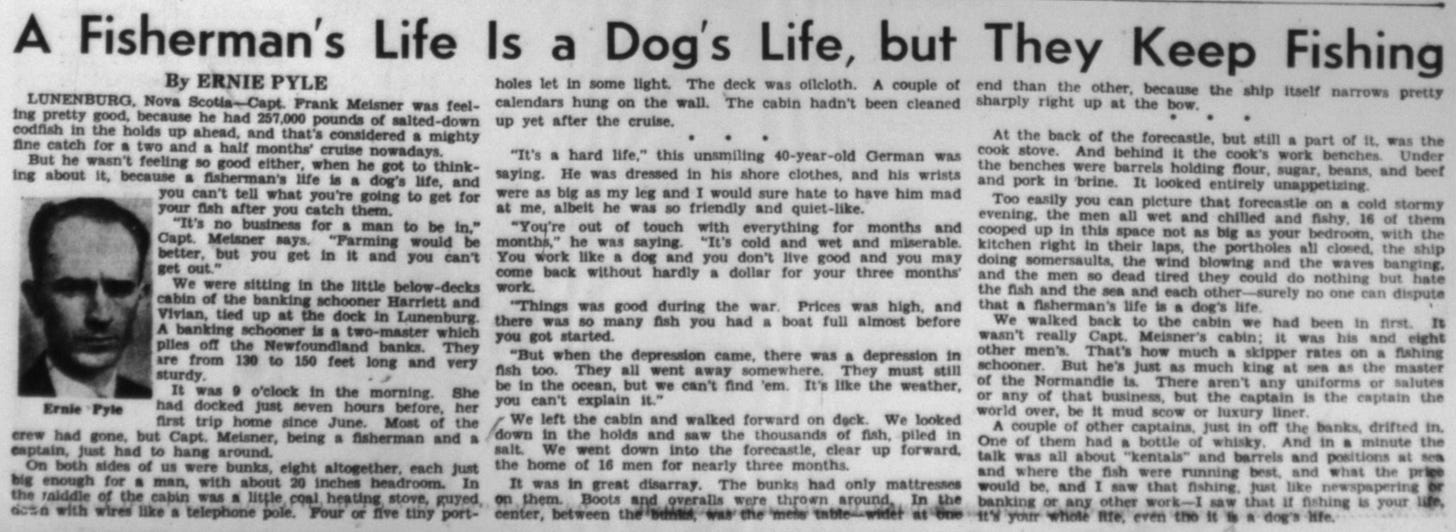August 30, 1935-A Fisherman’s Life Is a Dog’s Life, but They Keep Fishing
The Washington Daily News—Friday—August 30,—1935
A Fisherman’s Life Is a Dog’s Life, but They Keep Fishing
Ernie Pyle
LUNENBURG, Nova Scotia—Capt. Frank Meisner was feeling pretty good because he had 257,000 pounds of salted-down codfish in the holds up ahead, and that’s considered a mighty fine catch for a two and a half months’ cruise nowadays.
But he wasn’t feeling so good either, when he got to thinking about it, because a fisherman’s life is a dog’s life, and you can’t tell what you’re going to get for your fish after you catch them.
“It’s no business for a man to be in,” Capt. Meisner says. “Farming would be better, but you get in it and you can’t get out.”
We were sitting in the little below-decks cabin of the banking schooner Harriett and Vivian, tied up at the dock in Lunenburg. A banking schooner is a top-master which piles off the Newfoundland banks. They are from 130 to 150 feet long and very sturdy.
It was 9 o’clock in the morning. She had docked just seven hours before, her first trip home since June. Most of the crew had gone, but Capt. Meisner, being a fisherman and a captain, just had to hang around.
On both sides of us were bunks, eight altogether, each just big enough for a man, with about 20 inches of headroom. In the middle of the cabin was a little coal-heated stove, guyed to the deck with wires like a telephone pole. Four tiny portholes let in some light. The deck was oilcloth. A couple of calendars hung on the wall. The cabin hadn’t been cleaned up yet after the cruise.
● ● ●
“It’s a hard life,” this unsmiling 40-year-old German was saying. He was dressed in shore clothes, and his wrists were as big as my leg and I would sure hate to have him mad at me, albeit he was so friendly and quiet-like.
“You’re out of touch with everything for months and months,” he was saying. “It’s cold and wet and miserable. You work like a dog and you don’t live good and you may come back without hardly a dollar for your three months’ work.
“Things were good during the war. Prices was high, and there was so many fish you had a boat full almost before you got started.
“But when the depression came, there was a depression in fish too. They all went away somewhere. They must still be in the ocean, but we can’t find ’em. It’s like the weather, you can’t explain it.”
We left the cabin and walked forward on deck. We looked down in the holds and saw the thousands of fish, piled in salt. We went down into the forecastle, clear up forward, the home of 16 men for nearly three months.
It was in great disarray. The bunks had only mattresses on them. Boots and overalls were thrown around. In the center, between the bunks, was the mess table—wide at one end than the other, because the ship itself narrows pretty sharply right up at the bow.
● ● ●
At the back of the forecastle, but still a part of it, was the cook stove. And behind it the cook’s work benches. Under the benches were barrels holding flour, sugar, beans, and beef and pork in brine. It looked entirely unappetizing.
Too easily you can picture that forecastle on a cold stormy evening, the men all wet and chilled and fishy, 16 of them cooped up in space not as big as your bedroom, with the kitchen right in their laps, the portholes all closed, the ship doing somersaults, the wind blowing and the waves banging. The fish men so dead tired they could do nothing but hate the ship and the sea and each other—surely no one can dispute that a fisherman’s life is a dog’s life.
We walked back to the cabin we had been in first. It wasn’t really Capt. Meisner’s cabin; it was his and eight other men’s. That’s how much a skipper rates on a fishing schooner. But he’s just as much at sea as the master of the Normandie is. There aren’t any uniforms or salutes or any of that business, but the captain is the captain the world over, be it mud scow or luxury liner.
A couple of other captains, just in off the banks, drifted in. One of them had a bottle of whisky. And in a little while the talk was all “kentails and barrels and petticoats” as they called what the fish were running best, and what the price would be, and banking or any other work—just like newspapering or anything else. It’s your life, even tho it is a dog’s life.
💛 **Enjoyed this post?** Your support helps us continue to transcribe and promote Ernie’s work. Please click the link below to donate.





